

On Trial (1928) Warner Brothers Pictures. Director: Archie Mayo. Scenario: Robert Lord, Max Pollock. Titles-Dialog: Robert Lord. Photography: Byron Haskins. Editor: Tommy Pratt. Costumes: Earl Luick. Cast: Pauline Frederick, Bert Lytell, Lois Wilson, Holmes Herbert, Richard Tucker, Jason Robards, Franklyn Pangborn, Fred Kelsey, Johnny Arthur, Vondell Darr, Edmund Breese, Edward Martindel. 9 reels, Vitaphone. This film is LOST though Vitaphone discs exist at the UCLA film and Television archives for reels 1-2,4-5,7,9-10, plus discs for reels 1 (British Film Institute) and 8 and trailer (private collections).
This was Frederick's first talkie.
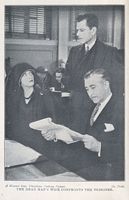 |
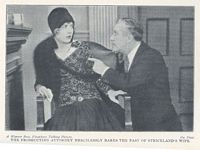 |
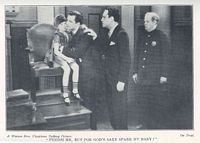 |
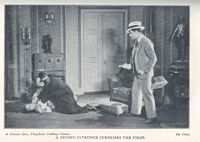 |
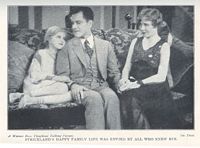 |
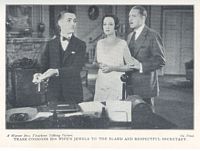 |
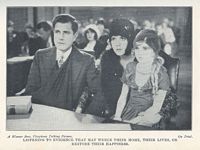 |
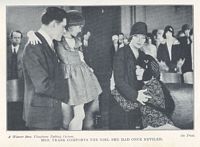 |
Warner Bros. production and release. Vitaphone all-talker based on stage play of same title by Elmer Rice. Directed by Archie Mayo. Byron Haskins, cameraman. Pauline Frederick, Bert Lytell and Lois Wilson featured. Opened Nov. 15 at Warner's New York, indefinite run at $2 top. Running time, 91 min.
| Joan Trask | Pauline Frederick |
| Robert Strickland | Bert Lytell |
| May Strickand | Lois Wilson |
| Gerald Trask | Holmes Herbert |
| Prosecuting Attorney | Richard Tucker |
| Defense Attorney | Jason Robards |
| Stanley Glover | Johnny Arthur |
| Doris Strickland | Vondell Darr |
| Turnbull | Franklyn Pangborn |
| Clerk | Fred Kelsey |
| Judge | Edmund Breese |
| Dr. Morgan | Edward Martindel |
Exhibitors with Western Electric equipment will do well with "On Trial." For them, despite certain marked defects in recording, this production can be classed as a semi-special. It is not a $2 topper. If a silent version is forthcoming theatre owners cannot expect it to be, at its best, better than a fair program picture, and this will require drastic changes in the talker version, which adheres very closely to the stage play.
More than any other exhibition of Warner dialog, "On Trial" proves that talkers, to an amazing degree, are a dry-cleaning medium for older Hollywood material. In this respect Bert Lytell, especially, comes out like a new piece of goods. Voice lends him a personality even greater than his silent heyday. Richard Tucker, Jason Robards, Lois Wilson are some others who are contrastingly more convincing and salable in sound.
The antithesis of these is Pauline Frederick. Recording can hardly be blamed because in the same positions on the various sets he majority of the cast enunciated throughout the greater footage in a way that made practically every word distinct and apart to those in the farthest rows. Miss Frederick was so throaty and her talking efforts were so obvious that seldom more than muffled sounds, almost indistinct in their entirety, emitted with the movement of her lips. Careful observers also detected that these sounds were imperfectly synchronized with them movement of her lips, especially the recording shots made while she was conspicuously placed on the witness stand. Miss Frederick is far from meriting featured billing, which she gets at the Warner theatre. Essayed as it is, her role is the least convincing in the cast and relegates to minor importance on the screen the part which was of stellar prominence in the original stage show.
Ground noise, or the scratching of records, is decidedly audible, even to the point of experts in the Warner home office admitting that the recording job in many instances does not shape up to previous releases. But--
Irrespective of recording and Miss Frederick's imperfect speaking performance, the stuff that pulls in the masses is in the story, which lets those masses in on the inside of a murder case. And the bulk of the cast is as close to being 100 per cent as the production is titleless.
While, like in the play, considerable courtroom activities are used, yet well-spoken parts, mannerisms and sidelines sustain interest each time until the flash-back to the scene of occurrence in the testimony. Comedy relief is injected in the court scenes, without impairment to predominating melodramatic qualities, by the brusqueness of Edmund Breese, the judge; more, however, by Fred Kelsey, who, as the pugnacious clerk, and by using the same tonality every time he swears in a witness, works up laughs from a cackle to a roar. Richard Tucker, as the sarcastic district attorney, exacts some mirth in his handling of legal machinery with the enthusiastic and inexperienced defense counsel, Jason Robards.
The performances of tiny Vondell Darr, as the sweet but precocious daughter of the man on trial, and that of Lois Wilson, wife of the accused, are outstanding. Little Miss Darr's voice rings with an appealing quality, so childishly sincere that, with her silent talent, emotionalism is at its peak during her testimony, which changes the tide for her father.
Miss Wilson's recital of how she was transgressed by the man whom her husband was accused of slaying is one of several anti-climaxes in the production. Missing since her husband disappeared and dramatically introduced in the courtroom on the final day of the trial, she controls her voice with such perfection that the audience is so concentrated in its tensity that the flash-back to the hotel scene where she was betrayed is barely apparent.
The shooting of Gerald Trask, played rather coldly by Holmes Herbert, as revealed in his widow's (Miss Frederick) testimony), is chilling until the revolver is exploded. The explosion is so recorded that it sounds like snapping a peanut.
Johnny Arthur does a good piece of work when recalled by the defense to give further testimony concerning the tearing of the card bearing the Trask safe combination. The audience knows that the doctor has just testified that the card could not be torn by Robert Strickland, the accused, because of a maimed hand, but Trask's secretary, out of the room at the time, joyfully reiterates his testimony. Arthur's ability to turn from comedian to tragedian when he finds he is tricked adds the final dramatic touch with his confession of stealing the money, which swings the jury for a complete exoneration of Strickland.
In the courtroom scenes only dialog prevails. The flash-backs provide conversations with a low and pleasing orchestral accompaniment
Last revised, February 22, 2010